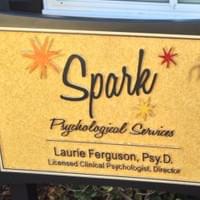
Image Description: a closeup of dandelion fluff, or pappus, that carries the seeds.
Dr. Ferguson is currently full for new therapy clients
Assessment openings are usually available in 3-4 months
(Autism Exploration Consults are available sooner)
Serving all of California via Zoom
Neurodiversity-Affirming* Assessment, Diagnosis, Therapy, Advocacy
Spark Psychological Services
Laurie Ferguson, Psy.D.
Licensed Clinical Psychologist*
Laurie Ferguson, Psychologist, Inc.
Philosophy
My grandfather was a machinist and tinkerer, and his garage was filled with things that needed fixing -toasters, car engine parts, radios. I was fascinated by his skill in turning sheets of metal in to things that were useful and beautiful. He made things run smoother, and he saved things that others thought were beyond repair. I approach psychological services in much the same way, with the idea that school, work, home life, and relationships can be more fulfilling and coaxed in to running more smoothly through hard work, dedication, skill, support, and creativity. Nobody, and no situation, is "beyond repair." Neurodivergent people do not need "fixing," and services are provided from a neurodiversity-affirming perspective. If you are ready to get on the right path, then let's get to work.

Support and Strategies,
Not Judgment
It takes a lot of courage to make the call to a psychologist. I consider it a privilege to become part of your or your loved one's treatment. My style is interactive, directive when it needs to be, and non-judgmental. Only you can truly understand what it is like to walk in your shoes. When counseling or assessing children and teens, parents and caregivers are crucial to treatment. While respecting confidentiality laws and a child's or teen's privacy, I make parents an integral part of the process whenever possible.
photo description: red and green vintage radios made of Bakelite, a type of synthetic plastic used in the 1940's.

You Are The Driver
My grandmother drove an old white station wagon with fins and bright red "pleather" seats. She absolutely loved to drive, and I remember the feeling when I took the wheel of my first car, one that my grandfather fixed up - a junkyard Ford Pinto that he spray painted bright yellow to cover the Bondo filling the dents. Pure bliss.
You are the driver in your therapy or assessment. You and I work together as a team - on your goals, not mine - and I am up front about
what I believe is needed for you to meet your goals. I coordinate with your physician, school,
and others as needed. If I think that another professional is needed, then I get you connected with that provider.
photo description: closeup of a steering wheel from vintage Chrysler car with a teal painted dashhboard.

A Whole Person,
Not "Just A Diagnosis"
I still have the Polaroid camera I bought as a teenager - one of those cameras that spits out a picture and it develops in front of your eyes. Magic. A moment caught in time.
Likewise, a diagnosis does not capture all of you. You or your loved one is more than a "label" in a medical chart. What a diagnosis may do is open doors to school supports, agency services, or insurance coverage. A diagnosis can be affirming and validating as you seek to understand your own way of processing information and social relationships.
When we conduct assessments or work in therapy, we are looking at a moment in time. A snapshot. I am a firm believer in the idea that the past does not have to dictate our future.
photo description: A Polaroid LM 630 camera held up in front of a blue sky with pale clouds.
Services
Assessment, Diagnosis, Therapy, Advocacy

Assessment & Diagnosis
Help your loved one reach their potential.
Dr. Ferguson specializes in assessment and diagnosis of Autism, ADHD/ADD, anxiety, OCD, panic, depression, and other concerns for children, teens, and adults. Kids can be bright but still have trouble in school. Adults can be motivated and hard working, but can have trouble in relationships, work, or in living independently. Maybe you have always thought that something is different for you or your family member, or maybe this is something new. Let's figure it out and prioritize well-being. Dr. Ferguson is a privately-contracted assessor for Tri-Counties Regional Center, school districts, attorneys, and families. Evaluations can be completed for supports in school or college, for Social Security benefits, or for your other providers who need more information to better serve you. Click on the Assessment tab above to learn more.
Photo description: boy in a hat looking up at airplane contrail against a blue sky with Morro Bay, CA in the background. Photo credit: Laurie Ferguson

Therapy for children, teens & adults
What are your goals?
Research-based interventions are the foundation of Dr. Ferguson's work, individualized to fit each unique client. This often means modifying traditional approaches to be neurodiversity-affirming. "Walk and talk" sessions around the nearby Sunken Gardens, in-office sessions, over zoom or the phone are available to meet a variety of accessibility needs. Play therapy and art therapy are also important ways that children learn to talk about emotions, coping, and getting better. For teens, they are often more able to talk about what is happening, although art continues to be an excellent avenue for exploring identity, relationships, goals, and stress resilience. Managing anxiety and mood, improving self-advocacy, and developing positive self-esteem are common reasons that individuals of all ages come to see Dr. Ferguson. Adults may also come in to learn about Autism for themselves or a loved one. Life can throw us curve balls at any age, so let's get you living the life you envision.
Photo credit: Xavier Bailey Photography. Photo description: a wooden sailboat on the ocean with the sun shining behind the sail.

Advocacy
Ever feel like you are going around and around, getting nowhere?
"Systems" can be confusing - schools, courts, Regional Center, Social Security, insurance, agencies - What do they do? How do you qualify? Where do I start? Many families are not aware of the possible services they may be eligible for. It can feel like going to a restaurant without a menu. Often, parents believe that the school will identify any learning issue early on, and offer support. Every organization is limited by the things that limit us all -- time, staff, and money. Families need to become their own advocate, and Dr. Ferguson can support you, providing guidance, realistic advice, and assessment or therapy services as needed.
Photo description: Tilt-a-whirl ride at the California Midstate Fair, shot from below with people swinging out against a blue sky, Paso Robles, CA, photo credit Laurie Ferguson
Diversity is Celebrated
People of all backgrounds are welcome in my office, including all racial, ethnic, religious, political, gender identity and gender expression, sexual orientation, socioeconomic backgrounds, and neurodivergent* individuals. To be effective, counseling must be a safe, accepting, and validating space.

Image Description: A signpost in New York City near the historic Stonewall Inn with a brown sign that reads Gay Street, a purple sign that reads Lesbian Street, dark blue sign that reads Bisexual Street, a light blue and pink and white sign that reads Trans Street, a turquoise sign that reads Queer Street, a green sign that reads Intersex Street, a yellow sign that reads Asexual Street, an orange sign that reads Nonbinary Street, a red sign that reads Pansexual Street, a hot pink sign that reads Two Spirit Street, and a black sign that reads Plus Street using a plus symbol.
- Photo taken by Laurie Ferguson, 2019.
*What is Neurodiversity and Neurodivergence?
Neurodiversity encompasses the many ways we as human beings think, act, and relate that can be neurotypical (what society tells us is average, "normal," or typical) or neurodivergent (different from that "average," which is often defined by neurotypical ideals). Neurodivergence describes neurologically-based differences that includes Autism, ADD/ADHD, many forms of anxiety (including OCD and panic), learning differences, certain personality features, bipolar and other mood changes, sensory processing differences, epilepsy, and more. People who are neurodivergent are much more likely to identify within the LGBTQIA+ community than individuals who are neurotypical. The neurodiversity community values social justice, inclusion, and support so that neurodivergent individuals can live full lives free from discrimination.
Your experience
Neurodivergent individuals are often stigmatized and may be reluctant to seek help, diagnosis, or support. Recent events have highlighted a reality that BIPOC (Black, Indigenous, and People of Color) and LGBTQIA+ folx have experienced for generations. These inequalities are not new. The intersectionality of multiple facets of marginalized identities compound adversity and discrimination. It is my job to understand and support you in your counseling experience so that you can reach your goals. While I will ask you about your unique background and experiences, I do not expect you to be my educator where systemic discrimination is concerned - it is my job to stay educated. It is important to me to continue to learn, and I participated in the SLO ACCEPTance Project training to better support the mental health needs of the LGBTQIA+ community.
Allyship
Counseling is not just discussions in the therapy office, and then we each go back to our respective lives until the next session. Counselors are in a position of privilege and can be effective allies and advocates, working to change the systems that perpetuate inequality. Rebuilding our institutions to be more inclusive, helpful, efficient, and affordable for everyone has fallen disproportionately to groups with the fewest resources to make those changes. It is time for those with access and privilege to do their part as well. I was on the Board of Directors of the Central Coast Autism Spectrum Center for 9 years, and was the Ethics Chair for the Central Coast Psychological Association. I also founded Parents And Allies For Positive Change, which advocates for students, teachers, and school staff. An integral part of my work is advocating for clients in school or college, with the Regional Center and Social Security, and in their work place.
Autism
Kids, Teen, Adults, and "high-masking" individuals are welcome. It is never too late to learn about yourself.

Photo Description: Hillside in the spring covered with yellow mustard flowers and a live oak tree bent from the wind. Oaks do an incredible job adapting to environmental demands. Photo credit: Laurie Ferguson, Poly Canyon, San Luis Obispo, CA, 2016.
There are two options for learning more about possible Autism for yourself or a loved one: a formal assessment, or the Autism Exploration Consultation. Click here to learn more and see below for more information Autism.
Autism is as unique for each individual as the infinite varieties of music. Both Autism and Asperger's are now considered under the "umbrella" of Autism, which is a neurological difference and a natural, valid part of human diversity. You might see common characteristics of Autistic people, ADHDers, and people with sensory processing or learning differences. Being Autistic does not necessarily impair day-to-day life for everyone and can bring strengths and skills. Support, understanding, and acceptance are key. When supports are needed, such as with improving communication, learning, independent living skills, and social relationships, it is crucial to also preserve and celebrate who you are.
Do Autistic people have a "disorder," or is it a failure of our society to support the diversity of human experience? Is the disorder actually in society itself? Are some current interventions and therapies actually harmful to Autistic people? Many people in the Autistic community feel that the way Autism is currently assessed and "treated" results in further marginalizing people who are already vulnerable. When you come to Dr. Ferguson for a diagnostic assessment or for the Autism Exploration Consultation, you are seen as a whole person, not just a collection of "symptoms" and "behaviors." If you are seeking services (such as through school, the Regional Center, Social Security, etc.), the eligibility criteria for those services is important, but Dr. Ferguson will also ask about your experience as a person - in relationships, school, work, and home. Your strengths and skills are part of what makes you unique, and some in the Autistic community feel it is Autism that enhances those skills.
An assessment for Autism includes what we used to call Asperger's (some people refer to this as "high-functioning" Autism, although these labels regarding level of functioning obscure both challenges and strengths, and the Autistic community sees functioning labels as ableist). Perhaps you are looking for support for issues related to job difficulties, college, relationships, parenting, or independent living. Succeeding in these areas can sometimes be more challenging if you are Autistic, while you also have unique strengths. "Masking," or covering up your Autistic traits to appear more "neurotypical" (NT) can lead to exhaustion and burnout. Sometimes, it is more important for the environment to change, rather than you. Becoming your own self-advocate is important so that you can feel comfortable voicing your needs. Dr. Ferguson can help coordinate with the services you might already receive, and consult with you (or your family if you wish).
Autistic individuals largely prefer the term "Autistic," as it is part of their identity and it is a big part of who they are. You can't take it off like a jacket. The earlier "person first" movement ("person with autism") was well-intentioned and meant to highlight that everyone should have the same rights. But now many in the Autistic community want to stress that Autism is central to their identity, preferring "identity first" language ("Autistic person"). Bottom line, it is up to the individual. Just ask!
Email Dr. Ferguson for assessment details or questions. Please be yourself and let Dr. Ferguson know what works for you and doesn't work for you (is email more comfortable than a phone call? Does anxiety make it hard to come to the office?). The same goes for the assessment too: be yourself. Dr. Ferguson wants to make you as comfortable as possible. She will review your needs, your goals for assessment, and any questions you may have. You are welcome to bring a family member or friend with you to the assessment, and support animals are welcome. Your information is kept confidential, and is only released with your written consent, even if someone else pays or makes the appointment for you. Dr. Ferguson communicates in a clear, straightforward, respectful, logical, solution-focused manner to help you achieve your goals. Individual, couples, and family therapy can be provided as needed.
ADHD / ADD
No, you're not lazy or unmotivated.
Photo description: Union Square and Maiden Lane cross-crossed with string lights in San Francisco, CA at night. Photo credit: Laurie Ferguson, 2021.
One day she finishes things well, and the next day it's like she's never seen the task before. It's because she has "spent" all her energy and needs to replenish. Think of ADD / ADHD like a bank account. It takes time to save up enough capital for the next task. It's not because she can't do the task, it's because she can't always do it when required. People with ADD or ADHD get mislabeled as "lazy," "oppositional," or "unmotivated." Most of my clients with ADD or ADHD want to get good grades, do well at work, and not upset their parents, boss, or spouse. Most feel terrible that they are letting people down. If it goes on too long, those negative labels are easier to believe about yourself. We can help people before that happens.
ADD / ADHD is a brain-based neurological difference. Productivity, organization and attention will be inconsistent, so sometimes things go well and other days can feel like "starting at square one." This is not due to lack of motivation or willfully not taking care of responsibilities. Regulation (feeling and behaving in a balanced, "even" manner) can also be very difficult. But improvement and success are possible.
People with ADD and ADHD are often extra creative, out-of-the-box thinkers who can focus intensely on their passion (art, science, video games, fixing cars, or...?). Their minds can jump ahead several steps and maybe even think up a great invention, while everyone else is still on problem #1. They are paying attention - just not to what other people think is a priority right now. These can be great qualities in entrepreneurs and inventors, but not so much for the student trying to graduate and the employee who needs to pay the rent. We can nurture creativity while helping people to be successful through supportive strategies at school, work and home, and sometimes medication through their physician. We can assess whether it is ADD / ADHD or something else, so they can have proper supports.
Everyone is different, and supports will be too. Some students find that they can show what they know if they have more time on tests, a quieter room for test-taking, help organizing assignments, note taking help in college, priority registration, maybe tutoring or small-group instruction, and a reduced work load. At work, strategic breaks, working remotely or in a quieter setting, improving planning and organization, and individualized work schedules may help. Understanding what your unique needs are to keep you optimally alert (not over-energetic, not too relaxed) can improve your studying and work pace. Maybe insomnia, anxiety, depression, stress, or medical issues are exacerbating issues. A solid assessment, treatment plan, and effective strategies for your unique situation can get you on track.
Anxiety and OCD
Make it work for you instead of against you.
Photo Description: Small, cozy cabin in a meadow surrounded by a cedar forest with mountains in the background.
Maybe you avoid crowds, parties, or school / work events. Sometimes this is a needed way to feel better and evaluate what might need to change (sensory aspects? the environment? expectations?). But if your world is slowly shrinking in ways that aren't working for you, then you can begin to feel socially isolated, school or work becomes harder, you miss things you want to do, or self-esteem suffers. Panic can be scary and exhausting. Obsessive-compulsive symptoms might be controlling how you do certain things - or seemingly everything. Anxiety, panic, and OCD limit our happiness, all while providing an elusive "just right" feeling that becomes more and more difficult to sustain. It seems impossible, but anxiety, panic, and OCD are very treatable.
A note on introversion -- it's normal! In fact, some researchers think there are more introverts than extroverts, even though society rewards those who are the life of the party. Introversion is not necessarily problematic and may not need treatment - unless it's causing you stress and holding you back in relationships, work, or school. Sometimes, having a mis-match between your introverted nature and your environment can cause anxiety. Many introverts tell me their ideal environment is a "cabin in the woods," but they need to function in a busy home, school, or office. Through proper assessment, we can figure out what is going to help you to feel most at peace, with or without that cabin.
Working on anxiety can be... anxiety-provoking. Change is hard, until it becomes too unbearable to continue in old patterns. I see myself as a guide. It's your journey, and you decide how fast to go and whether to stop and take in the scenery. Together, we will set goals, make a plan, and help you lead a fuller, more peaceful life. Treatments known to work are used, including empirically-validated cognitive behavioral therapy, exposure and response prevention, and acceptance and commitment therapy - all individualized to your needs and your neurotype. You set the pace.
Learning Differences
What is a learning disability? What about learning differences?

Photo Description: Student with dark hair, glasses, and striped shirt reading a book with a black cover
A learning difference means that you learn differently from the "average," and supports may be helpful for you to succeed and meet your potential in school and work. Advocating for yourself or a loved one may be challenging if you don't know what to ask for or whether you are eligible. You may or may not meet diagnostic criteria for a learning disability, which is a medical diagnosis that may open up services in K-12 school (IEP or 504 Plan), college, work (ADA accommodations), job training supports, Social Security, the Regional Center or other services. Whether seen as a difference or disability, getting the support you deserve is important to well-being.
There are many different ways of learning. Some people are visual learners, others need to hear information to remember it, others are hands-on (kinetic) learners. If you have Dyslexia (a reading disability), that can affect math too, such as word problems. A learning disability in math (Dyscalculia) may mean you also have trouble with telling time, reading maps, and understanding left/right. A Non-Verbal Learning Disorder (NVLD) may mean that you have trouble understanding communication that isn't verbal, such as reading facial expressions, body language, and other social cues.
Some individuals have challenges with executive functioning, which is the ability to organize, plan, prioritize, start and finish tasks, control impulses, regulate emotions, and keep working even when it is boring or hard. Sometimes these challenges include a slower than "typical" processing speed, which can mean homework and chores take a lot longer. One day someone may finish tasks and be on top of things, and another day things fall through the cracks. These differences may be brain-based, not because the person is "just lazy" or "unmotivated," and may be part of ADHD or learning differences. Understanding the way you learn and use executive functioning skills can be relieving, and getting support can be life-changing.
Dr. Ferguson screens for learning differences and related concerns like executive functioning in all of her assessments.
Assessment
Proper assessment gives you a roadmap, direction, and knowledge about yourself. Diagnosis isn't a label - it's a key to open the door to services and / or self-acceptance.
Photo Description: A clover-leaf freeway interchange lit up at night with multiple off-ramps and surface streets.
Why Dr. Ferguson?
Dr. Ferguson uses research-based, standardized assessment tools for diagnostic evaluations, and she includes in-depth conversations from a neurodiversity-affirming perspective to understand you as a three-dimensional human being - not just test scores. She will include specific tests that might be required by the services you are applying for, and she uses a neurodiversity-affirming approach while maintaining validity. Dr. Ferguson completes all aspects of the assessment process herself to ensure quality at every level. You receive a report explaining results using clear, understandable language. This report can help you apply for services and supports, if eligible.
Every assessment includes screening for a wide variety of related concerns, including learning differences or disabilities, ADHD, anxiety, depression, obsessive-compulsive experiences, social relationships, stress, sleep problems, mood disorders, sensory issues, auditory and information processing, planning and organizing abilities, speech and language skills, fine and gross motor skills, trauma, and other concerns. Sometimes, Dr. Ferguson may refer you to another professional for further testing or treatment, such as a Speech and Language Pathologist, Occupational Therapist, Audiologist, or Neurologist. It is important to look at the "whole person" so that we can develop appropriate testing and treatment strategies.
The first meeting with Dr. Ferguson is two hours, which actually flies by since there is so much to talk about. There are lots of toys to keep younger children busy. The client attends (along with a caregiver if the client is a minor). For adult clients, you decide who comes to the assessment - even if someone else is paying. We discuss development, medical conditions, school/college/work history, social relationships, mood, behavior, sleep, likes/dislikes, and goals for the assessment. There are questionnaires to fill out and bring to the meeting. Sometimes, we can answer all your questions and determine a diagnosis during that one appointment, while assessment of ADHD and Autism take longer. If you are coming from out of town, we can try our best to fit your schedule. The report is usually completed three to four weeks following the last assessment session. We will have a feedback session to go over all results and recommendations in understandable language and answer any questions.
Click here for Fees. To set up an assessment or for questions, email Dr. Ferguson's office. She will review your needs and your goals for assessment. Please be yourself!
Insurance
Dr. Ferguson is a contracted provider for the Tri-Counties Regional Center (TCRC). If you are referred by TCRC, you do not owe any fees or co-pays to Dr. Ferguson, although TCRC may bill your insurance, so be sure to speak with them directly.
For all other insurance plans, Dr. Ferguson is an "Out-of-Network Provider." This means you are responsible for the full fee at the time of service. You will be provided with a Super Bill for you to submit to your insurance. Depending on your insurance plan, you may be reimbursed a portion of the fee. However, some insurance companies are no longer covering assessment for autism and ADHD. Be sure to call your insurance company and ask for details. Click below to download tips on talking with your insurance carrier about out-of-network benefits, and there is also information on your right to a good faith estimate of services.
Fees

Image Description: Seagulls flying over the ocean as the sun sets off the California coast.
Autism Exploration Consultation $375
In a one-hour consultation, we focus on whether Autism may be a fit for you. This is not a diagnostic assessment and no report or diagnosis are provided, so this would not be sufficient for college or job accommodations, educational supports in K-12th grade, regional center supports, or social security applications (scroll below for formal assessments and report options). You do not need a consultation or formal assessment to self-identify as Autistic, so this short consult is for clients who want to explore whether Autism and/or other ways of being neurodivergent (such as ADHD, sensory processing, anxiety, etc.) may be a fit. We talk about resources, recommendations, and whether formal assessment would be helpful for your goals. If you know a formal assessment is needed, you can begin that process without a consultation.
Consultation $300
In a one-hour consultation, we talk about your concerns and develop a plan to help you reach your goals, or it can be a one-time session to address a limited concern. A consult can be helpful if you are not certain if you need a formal assessment, or if you want to see if counseling or assessment with me is a good fit. There are multiple types of assessments and therapies, and I will be able to advise you if a referral to another professional or service is needed (occupational therapy, speech and language therapy, IEP or 504 Plan through the school district, tutoring, educational therapists, job coaches, psychiatry). Navigating these "systems" can be confusing, and together we can develop a road map. There IS such a thing as "too much therapy," and families do not have unlimited time and resources, so I can help you prioritize services. I provide referrals if you or I decide that another professional will be better able to support your needs. If you desire follow-up consultation or therapy, fees are $160 for 50 minute sessions, and $175 for 60 minute sessions.
Diagnostic Assessment - starts at $1950
This is an ideal option for individuals who want clarity on diagnosis, strategies that can help improve school and work, and information about their unique traits and patterns of thinking, working, communicating and relating to others. Together, we will assess Autism, ADD/ADHD, mental health concerns (anxiety, panic, OCD, depression and bipolar concerns, trauma), sensory processing, and behavioral concerns. Screening for learning differences is also included, but further testing would be needed for diagnosis of learning disabilities. If you require supports in school (such as an IEP or 504 Plan in K-12 grades), Social Security, or the Regional Center, these agencies/systems may need to conduct their own testing to determine your eligibility; while sharing our report can be helpful, it is not necessarily required. This assessment has typically been sufficient for those seeking supports in college and ADA accommodations at work. Fees begin at $1950, including testing, feedback meeting, and comprehensive report. If additional testing is needed, the fee is $300 per hour.
Therapy, College and Career Counseling, Life Transitions
This has been an incredibly stressful time for many clients due to the pandemic, changes in school or work, or relationship concerns. College decisions, career changes, and other life transitions can be easier with a counselor who can support you. Executive functioning differences, anxiety, or depression may benefit from targeted strategies, and together we set your goals. All therapy starts with a 60-minute intake, which is $300. We talk about what has worked and not worked in the past, and we will make a plan to help you reach those goals. Follow-up therapy sessions are $160 for 45- to 50-minute sessions. A 60-minute session is $175.
Professional Consultations and Trainings
For clinicians, teachers, supervisors and allies who want to learn more about Autism, ADHD, learning, executive functioning, trauma, behavior, sensory differences and more through a neurodiversity-affirming lens. Individual case consultations or trainings are $300/hour (or share the cost between 2-3 colleagues). There are a variety of small and large group consultations and training seminars for you or your organization that are an affordable way to build a professional network while learning. See Seminars for current offerings.
Forms & Helpful Info
The journey of a thousand miles begins with one step -- Lao Tzu

Image description: A man wearing a faded red shirt and carrying a backpack is walking in front of a mural painted on a brick wall that says Good in blue script writing.
To confirm your appointment with Dr. Ferguson:
1) Make an appointment with Dr. Ferguson (email using the Contact tab above)
2) Download and send the Intake Forms
Your appointment is not confirmed until the steps above are complete.
Do not send Intake Forms without first making an appointment with Dr. Ferguson.

Image Description: Two dogs in a zoom meeting discussing the merits of bones versus dog biscuits.
The Yorkshire terrier is a fan of dog biscuits and the French bulldog swears by bones.
ZOOM LINK
If you have a scheduled appointment, click Zoom Link above to go to Dr. Ferguson's waiting room. If you have a scheduled appointment, you will be let in to the meeting.
Zoom Meeting ID: 805 610 8694
Passcode: spark
For Professionals
Dr. Ferguson provides consultation, assessment, therapy, and advocacy individualized for you and your clients. The creation of a thousand forests is in one acorn. -- Ralph Waldo Emerson
Neurodiversity-Affirming Consult Groups
See Seminars tab for Advanced and introductory groups are offered. Understand Autism, ADHD, learning differences, sensory processing differences, anxiety, panic, trauma, OCD, and other experiences through a neurodiversity-affirming lens. Part of each session will be training, part will be case consultation. The Advanced Consult Group will focus more on case consultation. You will come away with resources and knowledge to help you become a more effective, skilled, and supportive clinician and/or assessor to your neurodivergent clients. Learn the language preferred by the neurodivergent community and how ableism impacts our work. See why we miss and misdiagnose Autistic women, girls, andd LGBTQIA+ individuals. See the Seminars tab for current offerings.
Private Practice Consultations
Dr. Ferguson enjoys supporting new and seasoned practitioners locally and throughout the state of California to establish and maximize their private practice. We have a provider shortage and we need good, talented professionals to serve our communities. From setting up your office to insurance, licensing, networking, social media, confidentiality concerns and marketing, Dr. Ferguson can help you to create a welcoming, ethical, and productive space for your clients. A successful practice requires more than just "hanging out your shingle." How can you stand out from the sea of providers in your community? Do you have a specialty (and are potential clients aware of it)? What are your goals for growing your practice and serving your clients?
Clinical Case Consultations for Providers
When a counselor or psychologist needs to consult with another professional, is important to seek out experienced feedback. Dr. Ferguson has over 25 years in the mental health field and has worked in hospitals, the San Francisco county jail, and community mental health clinics. For the last 11 years she has been in independent private practice. Dr. Ferguson was the former Ethics Chair of the Central Coast Psychological Association and for 9 years was on the Board of Directors of the Central Coast Autism Spectrum Center. Consultations with Dr. Ferguson can help you generate new ideas to better serve your clients, address ethical concerns, and deliver high-quality care.
Regional Center Eligibility
Dr. Ferguson is a privately-contracted assessor for Tri-Counties Regional Center (TCRC), working with children beginning at the age of 18 months to adults. Primarily referred for questions of autism spectrum issues, cognition, and adaptive skill deficits, individuals are also assessed for mental health concerns. Dr. Ferguson provides her findings to TCRC, who makes the final eligibility decision.
Seminars
Payment Portal for Seminars Only
Contact Dr. Ferguson for payment links for therapy and assessment
REGISTRATION CLOSED Advanced Neurodiversity-Affirming Case Consultation Live/Online via Zoom
$35.00 - $220.009:00 – 10:30 PST
Wednesdays: March 9, March 23, April 6, April 20
Expand your skills with advanced concepts in neurodiversity-affirming case consultation. Ideal for clinicians, assessors, clinical supervisors, and providers who have a background in neurodiversity-affirmative care and are looking for a deeper understanding and additional tools and strategies to support their clients in reaching their goals.
The cost is $55 per 90-minute session for a total of $220. A CE Certificate is available for $35. We must have at least 10 attendees to run the group. There are sliding scale spots available for BIPOC, LGBTQIA+ and neurodivergent folx as well as students, so please send Dr. Ferguson an email to inquire. See additional information below.View more details...SelectQuantityAll options are out of stockComing soon

REGISTRATION CLOSED March-April Neurodiversity-Affirming Consultation Group
$300.00The March-April ND-Affirming Group meets at 9am PST over zoom on Tuesdays: March 15, 22 and 29, and April 5. This is ideal for clinicians, assessors, supervisors, providers, family members and allies. You will access to the slides and information after the meeting. The ND-Affirming Consultation Group will give you a jump start in understanding Autism, ADHD, learning differences, sensory processing differences, anxiety, panic, trauma, OCD, and other experiences through a neurodiversity-affirming lens. Part of the session will be training, and part will be case consultation. Speakers from the field can help you widen your understanding and provider network. You will come away with resources and knowledge to help you become a more effective, skilled, and supportive clinician, assessor and/or ally to your neurodivergent clients. The cost is $75 per 90-minute session for a total of $300. There are sliding scale spots available for BIPOC, LGBTQIA+ and neurodivergent folx as well as students, so please send Dr. Ferguson an email to inquire. No CE units available at this time. If CE units can be provided, this will be an additional cost.QuantityAll options are out of stockComing soon

REGISTRATION CLOSED / Jan-Feb Neurodiversity-Affirming Consultation Group
$220.00The January / February ND-Affirming Group meets at 9am PST over zoom on Wednesdays: January 12 & 26, February 9 & 23. This is ideal for clinicians, assessors, supervisors, providers, family members and allies. You will access to the slides and information after the meeting. The ND-Affirming Consultation Group will give you a jump start in understanding Autism, ADHD, learning differences, sensory processing differences, anxiety, panic, trauma, OCD, and other experiences through a neurodiversity-affirming lens. Part of the session will be training, and part will be case consultation. Speakers from the field can help you widen your understanding and provider network. You will come away with resources and knowledge to help you become a more effective, skilled, and supportive clinician, assessor and/or ally to your neurodivergent clients. The cost is $55 per 90-minute session for a total of $220. There are sliding scale spots available for BIPOC, LGBTQIA+ and neurodivergent folx as well as students, so please send Dr. Ferguson an email to inquire. No CE units available at this time.QuantityAll options are out of stockComing soonSpark Blog
Thoughts, Opinions, and Strategies
March 8, 2022You don't need to read a library full of books or have a fancy degree to be able to say you are...June 28, 2021YES! The end. Another, more comprehensive, and (hopefully one day needlessly) detailed post...September 6, 2020Is Anybody Listening? Adults coming for an autism assessment tell me their childhood was like...September 6, 2020Wrong Diagnosis The majority of female clients coming to me for assessment or counseling tell...June 26, 2020Your opinion and experience matters. Too many times I have heard from clients, colleagues, and...March 24, 2017You're a shrink, right? Whenever I hear "shrink," I think of a client lying on a couch with a..."What is therapy (or assessment) for?" It can be helpful to explain to your family member why...June 10, 2016I work with a lot of teens and they have great ideas for beating stress. Some figure out they are...June 10, 2016Kids are dealing with more stress than ever. Help your child learn the skills to chill.June 9, 2016About 75% of my patients complain of poor sleep. Most have tried everything, but still can't fall...Social Media
News, Articles, Research
Gallery
To help make you feel at home, the office is filled with books, toys for kids, and cozy places to sit.Thanks to Jennifer Rennick Architecture & Consulting for the plans to make the vision a reality, Royce Construction for the help in knocking down some walls to make our space more welcoming, and Pacific Heating for installing individual heating and cooling units in each therapy room. Art shown with permission.
Photo descriptions (L-R): Sign in front of the building is a yellow background with brown lettering saying Spark Psychological Services, Laurie Ferguson, Psy.D., Licensed Clinical Psychologist; waiting room with couches, chairs, and toys for kids; Dr. Ferguson's office with couch, chairs, and plants; Another view of waiting room with chairs, bookshelf, and reception desk; Child with art project made from wax string in colorful spirals that he put over his eyes like glasses.

Image description: wooden sign painted with the phrase "Love what you do and do what you love."
Like this website?
me too
I built this website on my own, using Strikingly Website Builder
(no expensive designer or web manager needed)
I believe in supporting neurodivergent people in creating the work environment that fits for them, and that might mean starting your own business or practice. I do not advertise, and all my clients come from referrals or website searches. Strikingly may work for you too.For more info: https://www.strikingly.com/a/cvFP98Accessibility Works!Proud to be 100% compliant with Web Content Accessibility Guidelines (WCAG 2.1)See the little accessibility figure on this website?That helps people change the website to work better for their unique needs. Try it out!Accessibility and inclusion are important to Dr. Ferguson - comments about this website are welcome!
Send me an email through the Contact tab.
FAQ's
Super random info not found in this already text-dense website.
Some were questions that several clients have had, so I figured it would be helpful to share with you here.
Why did you become a Psychologist?
A good psychologist has seen some things in their life. Is it necessary that your therapist experienced the same struggles as you? No. A good psychologist will have had experiences, either directly or very close to them, that helped them build compassion, empathy, and perspective taking so that they can help you. I became a psychologist because I've experienced challenges and figured out ways to create resilience, and I want to help others do the same, using research-based strategies and tools.
Do therapists have therapists?
YES. Otherwise, it would be like going to a personal trainer who never works out, or a baker who never eats dessert. Therapists and psychologists should ALL have their own therapist so they know what it feels like to "be on the other side" of the therapy or assessment dynamic. Maybe therapy isn't needed all the time or maybe it is (just like for you), but every good therapist and psychologist should access therapy to keep them grounded and professional. Deep work is also needed for every mental health professional to explore their own fears, family dynamics, motivations, and internalized -isms (like ableism, sexism, etc.). I think therapy is great, so why miss out?
We're friends - can you see my kid?
Big nope. I also can't see your spouse, parent, or anyone else really close to you, and I can't see my mechanic, babysitter, or next-door neighbor. That's called a "dual relationship." Therapy and assessment works when it is neutral and unbiased, otherwise I might not have the same perspective. It also might make it hard for you to feel like you can be open and honest. Sometimes therapy requires being really vulnerable in ways you can't be with your friends or family. I often hear, "I've never told anyone this...." Privacy, confidentiality, neutrality, and having your own best interests in mind is what a therapist brings to your sessions.
Can you tell me all about your private life?
Nope. It's your session, not mine! It's natural to be curious about your therapist to understand where they're coming from. So of course you might want to know more about me. But a good therapist will use strategies and make recommendations based on your unique circumstances - not theirs. That's why we ask a lot of questions, and also spend time on our own learning about cultures, communities, and beliefs that are different than ours. A good therapist will be able to help and support you, even if their background is very different. I do share that I have children, that I am a military spouse, and that I'm white and Native American. Here is more about me.
About Dr. Ferguson
Licensed Clinical Psychologist

Laurie Ferguson, Psy.D. (she/her) what's this?
Photo description: Dr. Ferguson seated in a grey chair with bookshelf
and yellow lamp behind her.
Thank you for visiting my website to learn more about the services that can help you and your family.
My approach is honest, respectful, solution-focused, and based on understanding your strengths. I use techniques grounded in research and based on best-practice guidelines. All Diagnostic Assessments are completed entirely by myself using assessment tools widely recognized and accepted by the mental health and neurodiversity-affirming communities. Together we can help you achieve your goals.
I have been working in the mental health field helping children, teens, families, and adults since 1996. In 2002 I obtained my doctorate in Clinical Psychology from The Wright Institute in Berkeley, accredited by the American Psychological Association (APA). Training included an APA-accredited internship at The Children's Hospital in Denver, and a fellowship at the National Jewish Medical and Research Center in Denver (now called National Jewish Health). Training also included clinical positions at the San Francisco Department of Public Health, the USF Child and Family Center, and other out-patient and in-patient settings. Before attending graduate school, I was a mental health worker for the psychiatric units at the San Francisco County Jail and St. Mary's Medical Center in San Francisco. Additional training included the SLO ACCEPTance Project, and I am proud to provide mental health services to the the LGBTQIA+ community.
What is psychologist? In the state of California, it requires a doctorate degree (Psy.D. or Ph.D.) that includes supervised practical experience and training, a dissertation, and an additional 3000 hours of supervised experience after coursework is completed. Then a comprehensive licensing exam is taken. Once licensed, psychologists must continue to learn and gain experience in order to renew their license. Psychologists adhere to strict ethical and legal guidelines that are managed by the California Board of Psychology. Psychologists in California are doctors in that they have a doctorate degree in psychology, but they are not medical doctors and they are not licensed to prescribe medication.
I truly believe that lived experience is crucial in your clinician or consultant. This can help reduce the impact of neurotypically-centered societal norms that can impede a client's progress. I live in a family of multiply neurodivergent individuals that includes Autism, ADHD, learning and sensory processing differences, and other experiences. I am neurodivergent myself, and I am the primary care provider to an Autistic family member.
I am proud to support the Central Coast Autism Spectrum Center in San Luis Obispo, where I was a Board Member for 9 years. I am a PTA member with my children's schools. I am also a member of the Central Coast Psychological Association, where I was previously the Ethics Chair.
My office is located on Chumash and Salinan native land, and a portion of my income goes toward supporting the Proposed Chumash Heritage National Marine Sanctuary to preserve the beautiful coastline for generations to come, as well as Round Valley Indian Tribes community projects where I am an enrolled tribal member. To see the native lands where your home or business is located, see this interactive map.
In my spare time, I love to garden, read, travel, sail, and enjoy the beautiful Central Coast with my family. Midcentury modern architecture and art are particular interests. Fixing up our 1970's ranch house has been a labor of love, and I've become pretty adept at drywall, painting, and finding the right fuse before I attempt minor electrical projects.
Contact Dr. Ferguson
5975 Entrada Avenue • Atascadero, CA 93422
805-610-8694 phone • 805-460-6818 fax
DrF.SparkPsych@gmail.com
Serving all of California by zoom and in person appointments
Dr. Ferguson is currently full for new therapy clients
Assessment openings are usually available in 3-4 months
Short Autism Exploration Consults are available
Please read the following before submitting an appointment request:
Dr. Ferguson DOES NOT provide the following services:
- parental fitness, child custody, or visitation assessments
- court-ordered therapy
- treat addictions, substance abuse, or eating disorders as the main focus of therapy
- assessments or letters for surgical candidates
- emotional support or service animal letters
- forensic evaluations (if you are going to court or have legal involvement)
- worker's compensation or fitness-for-duty assessments
- Dr. Ferguson is a psychologist, not a physician or psychiatrist, and she does not prescribe medications
- Dr. Ferguson does not accept insurance. You will be provided with a Super Bill for you to submit to insurance, and any reimbursement depends on your insurance plan. See Insurance above for further information.
Accessibility and inclusion are important to Dr. Ferguson - comments about this website are welcome!
© 2016























